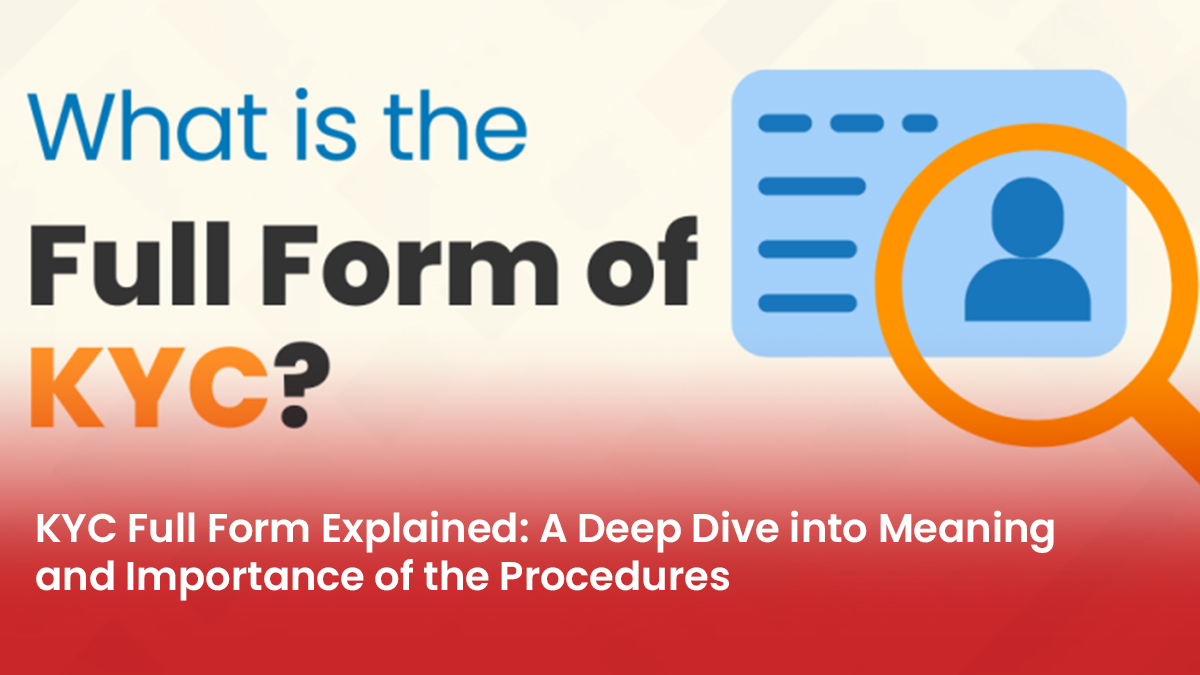KYC is a method used by all financial institutions, banks, and other businesses to verify the identity of their customers, such as whether the information provided by the customer is genuine or not.
This KYC process aims to prevent fraudulent activities such as money laundering, terrorism financing, and financial fraud. It ensures that customers with genuine information are performing the financial transaction, thereby adhering to the regulatory requirements.
This article provides an in-depth explanation of the full form of KYC, its importance in banks, and the various components involved in the KYC status check process.
What is Know Your Customer (KYC)?
KYC refers to the process by which financial institutions verify the authenticity of their customers by collecting and analyzing essential documents. The KYC update process helps financial institutions mitigate risks and maintain the integrity of the financial system. The primary goal of KYC is to:
- Ensure customer identity verification
- Prevent financial fraud
- Enhance security in banking transactions
- Comply with financial regulations
What is the full form of KYC?
The full form of KYC is abbreviated as Know Your Customer. This process is a key aspect in financial transactions, where businesses, particularly in banking, verify the identity of their clients. The KYC process ensures that all financial transactions are secure and that they comply with anti-money laundering (AML) and counter-terrorism financing regulations. It helps to prevent identity theft, fraud, and other financial crimes.
Financial institutions, including banks, require the KYC full form in banking to onboard new customers and ensure that all transactions are legitimate. If you are undergoing this process, expect to provide KYC documents full form such as Aadhaar KYC full form, PAN Card, and other supporting documents for verification.
KYC full form in Banking
In the banking sector, bank KYC full form stands for Know Your Customer. It is a mandatory requirement for all banks to follow KYC norms to onboard new customers and maintain secure transactions.
Key elements of KYC in Banking
The Reserve Bank of India (RBI) introduced the KYC form policy in 2002, which consists of four key elements:
| Pillar |
Description |
|
Customer acceptance policy |
Guidelines to determine who can open an account |
| Customer identification procedure |
Verification of customer identity using official documents |
|
Monitoring of transactions |
Regular tracking of high-value or suspicious transactions |
| Risk management |
Identifying and managing high-risk customers |
Banks require specific KYC documents full form such as:
- Aadhaar KYC full form document (Aadhaar card)
- PAN Card
- Voter ID
- Passport
- Address proof
These documents help banks conduct a KYC status check and validate the authenticity of a customer.
What are the different types of KYC
The Know Your Customer process is divided into several types based on the level of verification required. Each type of KYC serves a specific purpose, depending on the risk profile of the customer and the financial institution’s compliance needs.
1. Simplified KYC
Simplified KYC is meant for low-risk customers and involves minimal verification requirements. Customers need to provide their basic identification details, which are cross-checked against government databases. This type of KYC is useful for accounts with lower transaction limits, ensuring that financial institutions can onboard customers quickly while maintaining compliance.
Documents needed: Customers need to submit basic identity proof, such as an Aadhaar Card or PAN Card, along with a self-attested photograph.
2. Basic KYC
Basic KYC is a more detailed verification process where customers provide proof of identity and address. Financial institutions require these documents to confirm the legitimacy of an individual before allowing them access to banking services. This step ensures that customers are who they claim to be and reduces financial risks.
Documents needed: Customers must submit a valid Passport, Driver’s License, or Voter ID for identity verification, along with a recent utility bill or rental agreement as proof of address.
3. Enhanced KYC
Enhanced KYC applies to high-risk customers or individuals who engage in significant financial transactions. This process involves additional due diligence, background verification, and financial profiling to assess potential risks. Banks may request further documentation to ensure compliance with anti-money laundering (AML) regulations.
Documents needed: Customers need to provide financial statements, a tax identification number (TIN), and details of their income sources. Additional identity and address verification documents may also be required.
4. Corporate KYC
Corporate KYC is conducted for businesses and corporate entities. Financial institutions verify the identity of the business, its owners, and authorized signatories. The process includes validating company registration details, business operations, and financial standing to prevent fraudulent activities.
Documents needed: Businesses must submit company registration documents such as the Certificate of Incorporation, Memorandum of Association (MOA), Articles of Association (AOA), and Board Resolutions authorizing business representatives.
5. Periodic KYC
Periodic KYC is an essential requirement for maintaining up-to-date customer information. Banks and financial institutions periodically review existing customer records to ensure their details remain accurate and relevant. This helps identify any changes in customer profiles that may affect risk assessment.
Documents needed: Customers are required to periodically update their proof of identity and proof of address. This can include resubmitting a Passport, Driver’s License, Aadhaar Card, or a recent utility bill.
6. E-KYC (Electronic KYC)
E-KYC, or Electronic KYC, is a digital method for customer verification that eliminates the need for physical paperwork. This process leverages Aadhaar-based authentication and biometric verification to facilitate seamless onboarding. It enhances efficiency while reducing manual intervention.
Documents needed: Customers must submit digital copies of their Aadhaar Card, PAN Card, or Passport in an electronic format through the institution’s secure online platform.
Key benefits of KYC for financial institutions
KYC provides multiple benefits to financial institutions beyond compliance. Here’s a look at how KYC contributes to better financial practices:
|
Benefit |
Description |
|
Customer trust |
Enhances credibility by ensuring customers are legitimate |
| Risk management |
Identifies and monitors high-risk individuals or transactions |
|
Operational efficiency |
Reduces delays in transaction processing |
| Regulatory compliance |
Ensures compliance with global and local regulations |
Various challenges in the KYC implementation process
KYC is a very important system to implement, but this can be quite a challenge for businesses. While it is difficult, implementing a strong KYC system is important for financial institutions, as it helps them avoid financial crimes and regulatory penalties against themselves and their customers. For example, some major challenges that they could face include:
Cost and complexity
The KYC process can be costly and time-consuming, requiring significant resources and investment to implement and maintain. Small businesses, in particular, may struggle to meet the regulatory requirements for KYC compliance.
Data privacy and security
Collecting and storing customer data can be highly risky to the privacy and security of data. This is particularly so with cyber threats and data breaches on the rise. The financial institutions are required to ensure that customer data is protected against unauthorized access while complying with regulations on data protection.
Customer experience
The update process regarding KYC can be cumbersome for a customer and frustrating; as such, it creates long queues and delays. The financial institutions are, therefore, compelled to find ways of harmonizing the procedure with good experience for customers.
Global KYC requirements
With a globalized financial system, financial institutions must navigate a complex web of Know Your Customer regulations and requirements across different jurisdictions, making KYC compliance a significant challenge.
The role of KYC in enhancing financial security
KYC (Know Your Customer) plays a crucial role in maintaining financial security by identifying and verifying individuals or businesses engaging in financial transactions. This process is fundamental to protecting the integrity of the financial system. Here’s how KYC enhances security:
- Helps prevent financial crimes like money laundering and terrorism financing
- Ensures that only legitimate customers are allowed to open accounts or make transactions
- Facilitates monitoring of suspicious activities
- Ensures compliance with legal and regulatory standards
By complying with KYC norms, financial institutions maintain a secure environment for both businesses and customers. The KYC status check helps institutions identify any discrepancies in customer data, ensuring transparency and reliability in financial services.
Conclusion
Understanding the KYC full form is very important as it helps with secure and transparent financial transactions. Whether you are an individual or a business, you need to understand the bank KYC full form and the complete procedures for efficient financial transactions.
From Aadhaar KYC full form to e KYC full form, the Know Your Customer process plays an important role in modern banking. So get your KYC documents full form updated to avoid any transaction delays in smooth transactions and undue financial risks.
Following the norms of KYC, financial institutions and customers can work together in building a safe, scam-free financial environment.

























